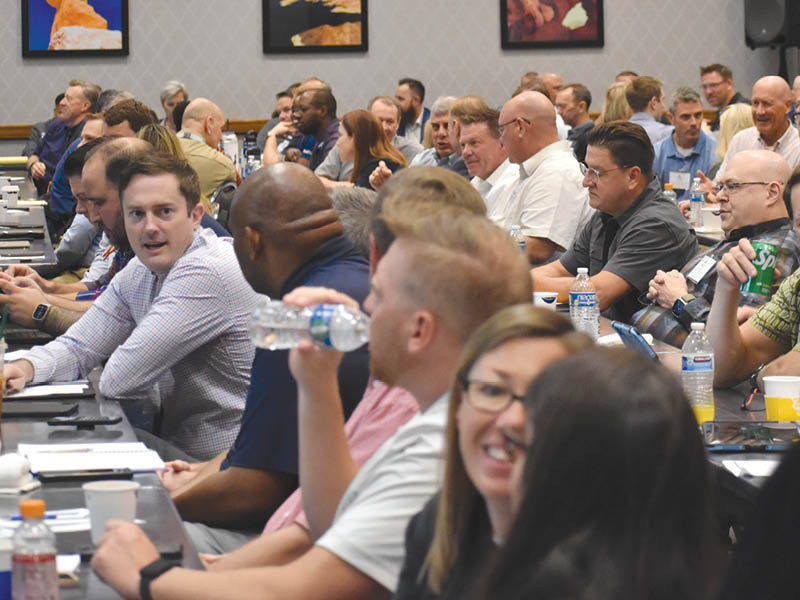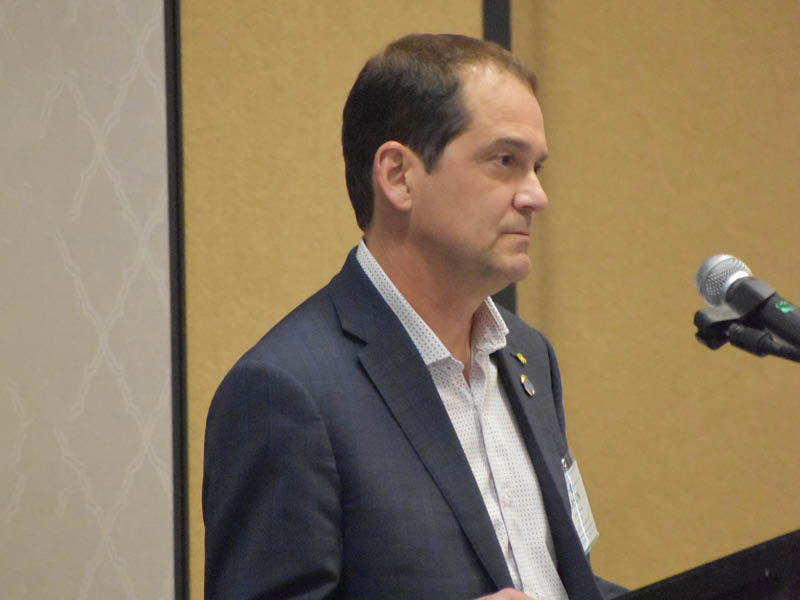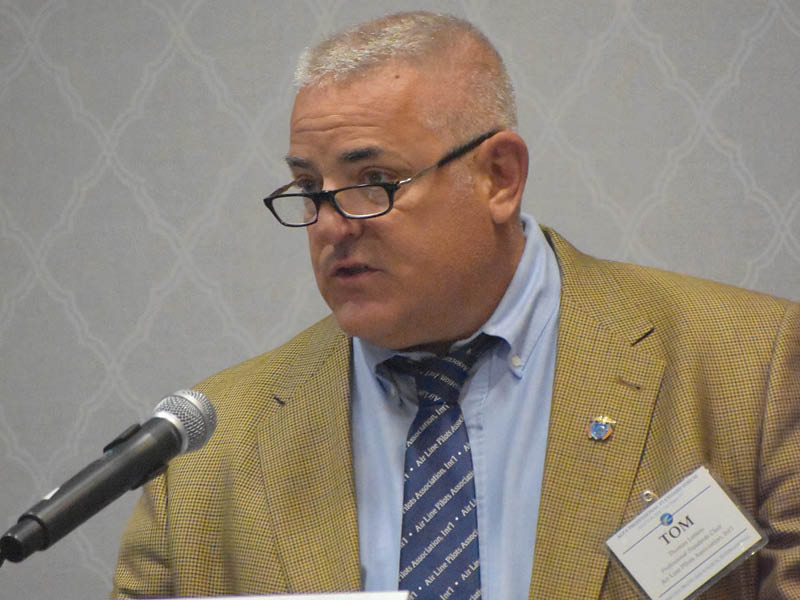Clearing the Air
Pilots Discuss Approaches to Conflict Resolution at Professional Standards Forum
By Gavin Francis, Senior Aviation Writer

More than 130 participants attend the Professional Standards Forum in Las Vegas, Nev., to learn about workplace conflict resolution and mediation.
More than 130 pilot volunteers representing 13 pilot groups from across the Association gathered in Las Vegas, Nev., April 23–24, for ALPA’s Professional Standards Forum. Participants also included management representatives from multiple airlines, dispatchers, air traffic controllers, and other pilot organizations. Attendees heard from speakers on a variety of topics related to their work facilitating conflict mediation in the workplace. They were given an overview of ALPA’s Air Safety Organization’s (ASO) structure, as well as a rundown of resources available to them, and had the opportunity to participate in breakout sessions to discuss issues affecting their specific pilot groups.
Capt. Tom Letson (Delta), the ASO’s Professional Standards Group chair, welcomed attendees to the two-day conference, along with Capt. Travis Ludwig (United), the Pilot Assistance Group chair; and Capt. Jason Graves (JetBlue), the Professional Standards Group vice chair. Capt. Jason Ambrosi, ALPA’s president, provided the forum’s opening keynote, taking the opportunity to emphasize the important role of Professional Standards volunteers.
“As one of the longest-standing groups under the ASO, you know that conflict resolution isn’t easy and that helping those who sometimes don’t want to be helped is frustrating,” Ambrosi said. “But you believe in the mission. And the mission of the Professional Standards Group—to protect and enhance the careers of ALPA pilots—is absolutely essential. Your efforts provide a safe and professional operating environment, which is fundamental for supporting our members and strengthening our profession.”

Capt. Jason Ambrosi, ALPA’s president, discusses the essential role Professional Standards volunteers fulfill in supporting pilots on the job.
Addressing Workplace Conflict
Generational differences can be a significant element in many workplace conflicts. Pilots across the generational spectrum often have different experiences, values, and communication styles. Fostering an inclusive and respectful work culture is crucial when addressing conflicts arising from generational differences. Commissioners Herman Brown and Xavier Merizalde from the Federal Mediation and Conciliation Services gave a presentation that highlighted some of those differences among the commonly recognized generational categories: the Greatest Generation, Baby Boomers, Gen X, Gen Y (Millennials), Gen Z, and the up-and-coming Gen Alpha.
“This is the first time in our history that we have so many generations in the workforce,” said Brown. “It’s very important that you all recognize each other, understand each other, and that you’re open to seeing things from a different perspective.”
Another source of conflict in various workplace contexts is implicit bias, attitudes, or stereotypes that unconsciously affect our actions, decisions, and understanding. Forum attendees heard from Prof. Nantiya Ruan of the University of Nevada, Las Vegas, William S. Boyd School of Law, who spoke about implicit bias and how awareness of implicit biases can help individuals to be more open to alternate points of view.
Ruan also spoke about microaggressions, the common behavioral or environmental indignities that communicate hostile, derogatory, or negative slights, sometimes inadvertently and unintentionally. “There’s a tendency to sweep microaggressions under the rug when they’re perceived as being unintentional,” she observed. “But it’s not about a person’s intent. It’s about the impact. For someone who’s constantly impacted by microaggressions, it’s like millions of mosquito bites over time.”
Drawing from his extensive experience working with law enforcement and consulting on investigations as a certified forensic interviewer, keynote speaker David Thompson, president of Wicklander & Zulawski and Associates, spoke to forum participants about interview techniques for empathy-based conflict resolution.
“How often in your role as a Professional Standards volunteer are you interacting with someone because they did something really good?” asked Thompson. “Probably not very often. When you sit down to talk with somebody, it probably means that it’s not a great day for them. So how do we talk to somebody who probably doesn’t want to be a part of the conversation?”
Thompson went on to discuss a variety of strategic communications tools he uses to build rapport, demonstrate empathy, and engage in meaningful and constructive dialogue. He explained some of the techniques used to de-escalate conflict by identifying when people are exhibiting maladaptive behaviors and responding in a way that builds rapport.
“You’re obviously going into these conversations trying to help, but sometimes something as simple as the expression on your face or the tone of your voice can be a problem. Our goal is to get as much information as possible out of that conversation, and to make sure that the people we’re talking to leave the conversation feeling respected, heard, and understood.”
Taking Care of the Caretakers
Professional Standards volunteers play a crucial role in facilitating constructive dialogue and helping to resolve conflict. However, the nature of the work can be emotionally demanding and can lead to compassion fatigue and eventually burnout if not managed effectively. Ludwig, who also serves as cochair of the FAA’s Mental Health and Aviation Medical Clearances Aviation Rulemaking Committee, spoke to attendees about how to avoid burnout by recognizing and responding to the early warning signs of compassion fatigue.
“Compassion fatigue is just the cost of doing business for us,” Ludwig remarked. “But there’s a much shorter recovery time for compassion fatigue as opposed to burnout, so the earlier we catch it the better.” He also acknowledged that it’s not always easy to recognize the signs and emphasized that it’s important to have a self-care plan. “The last person to understand that they’re about to drown is the person in the water.”
Looking to the Future
“We decided that we needed to develop an advanced course for our veteran volunteers,” said Graves, who’s spearheading the effort to develop ProStans 201, which he hopes will launch later this year. “We wanted to go deeper into resources, deeper into how we manage conflict resolution, and also provide some training on difficult cases. Unfortunately, knowledge keeps walking out the door. Every year, there are more and more new people and fewer of the same faces. And that knowledge isn’t transferred unless we mentor the new folks. Hopefully this new course will help us to develop some of our future Professional Standards leaders.”
One of the unique features of the forum was a panel of chief pilots who discussed the effectiveness of ALPA’s Professional Standards program from a management perspective. Capt. Tom Thornton (Delta), his Master Executive Council’s Professional Standards chair, moderated the panel, which included Capt. Brian Cink, Delta Air Lines regional director; Capt. Robert Neider, Envoy Air director of Flight Operations-Line; Capt. Christopher Lum, JetBlue director-System Chief Pilot; and Capt. Devin Hussey, Frontier Airlines chief pilot.
Letson introduced the panel, emphasizing the opportunity for a win-win relationship when Professional Standards and management work together. “We try to solve some of their problems and try not to fill up their desks with stuff. They have other things to do. They also don’t want to have to penalize someone without a really good reason. And we help to work out some of the little things for them.”

Capt. Tom Letson (Delta), ALPA’s Air Safety Organization Professional Standards Group chair, welcomes attendees to the two-day conference.
Thornton noted that progress had been made over the years in making Professional Standards a more effective program. “These Pilot Assistance groups used to work out of closets,” said Thornton. “We’d get a few calls a year, but nobody really knew who we were. I think we’re much more visible now.” But he stressed that building relationships was key. “The goal is to break down barriers and make sure you have some kind of interaction with your managements.”
Cink agreed that establishing a good relationship is important and acknowledged that management could be more proactive about promoting Professional Standards. “Disciplinary issues are probably less than 1 percent of our job. So the disciplinary aspect where you guys would come in and help is a pretty small portion of our workload. I think we could do a better job of bringing awareness to what Professional Standards does and how you all can help the pilots.”
Forum organizers wrapped up the successful two-day gathering with a promise to bring the event back in another two years and with much appreciation for those who attended this time around.
“You’re the backbone of our Association,” said Ludwig. “Nothing gets done without your work. Thank you so much for what you do and for the hours you put in. It means a lot to us, it means a lot to our Association, and it means a lot to your fellow pilots that you’re there to help them through what are sometimes some of their worst days.”
Professional Standards Needs You
Get more information about becoming an ALPA Professional Standards volunteer.

